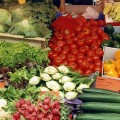Part 2
Courtney: And there have also been links to cancer with conventional food, conventional fruits and vegetables that we eat with chemicals in them. And it seems cancer is on the rise, and many people are dying from cancer. What do you think about this?
Sandy: I'm sure that pesticides have a lot to do with that, whether it's in the water we drink from runoff, getting into the water systems, or from the fruits and vegetables. Also, I've read that GMO, or "genetically modified organisms," or produce, has a lot to do with cancer, which is-It's not the same field as organic foods, but pretty much the same concerns are raised. Courtney: Okay.
Sandy: The foods that are modified genetically to repel insects or be bigger, or-so in the case, if you genetically modify a tomato to repel certain insects that are attracted to it, you don't have to use pesticides, but then you're consuming something that has been tampered with genetically, which is probably just as harmful. Courtney: Right. So on the whole, we are putting a lot of unnatural things in our bodies.
Sandy: Yeah, I'm sure that has a lot to do with the cancer rates. Courtney: Interesting, interesting. And it also seems that organic food production is on the rise. I recently heard an example in Cuba. Because Cuba is limited with imports from the United States or any boat that touches down in the United States for one year-no boats that go to the United States can go to Cuba for one year. So as a result, Cuba hasn't had connections to a lot of these pesticides and things that help the production of agriculture, so they have been forced to produce organically-grown foods. As a result, people are growing these organic fruits and vegetables, and apparently the flavor of these foods are supposed to be delicious, and they're very excited about this down there. Sandy: Yeah, well I know that if you do eat-certain foods, if you eat them organic, there's a huge difference. Like with carrots-
Courtney: In what?
Sandy: In taste.
Courtney: In taste?
Sandy: In taste, and you can notice this when you go to countries that don't use pesticides, like-I was in the Caribbean last year, in the Dominican Republic, which is a very poor country, and there's no need to farm anyway, because it's so luscious, so lush that you don't need to use that. And everything tastes different. It's-you can really tell. Courtney: Right, very interesting. And what about the prices here of organic food versus conventional food? Extraordinarily high, right? You were saying before-
Sandy: Yeah, it's usually pretty expensive, but there are-there's actually a co-op at the university here. If you just do a little bit of research, there are resources for students or people with less income, and there's a co-op here where you can have food delivered by a man who has an organic farm. It's expensive just because it's all paid at once. It's like $300, but you get all of your organic produce delivered to your door from a nice organic farm outside of the city, and it comes once a week, and that will last you, I think, six months, it's $300. Courtney: Wow, that's pretty good, I guess. Sandy: So it is cheap if you go in on it with a household, if you have roommates, three roommates or whatever, it's definitely worth it. Courtney: Interesting. Okay, well, let's wrap this conversation up. Thanks once again for joining me. We hope to talk to you again.
Sandy: No problem, thank you.

